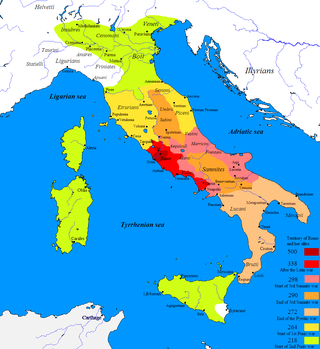Related Research Articles

Year 342 BC was a year of the pre-Julian Roman calendar. At the time it was known as the Year of the Consulship of Ahala and Rutilus. The denomination 342 BC for this year has been used since the early medieval period, when the Anno Domini calendar era became the prevalent method in Europe for naming years.

The Appian Way is one of the earliest and strategically most important Roman roads of the ancient republic. It connected Rome to Brindisi, in southeast Italy. Its importance is indicated by its common name, recorded by Statius, of Appia longarum... regina viarum . The road is named after Appius Claudius Caecus, the Roman censor who, during the Samnite Wars, began and completed the first section as a military road to the south in 312 BC.
This article concerns the period 349 BC – 340 BC.
This article concerns the period 369 BC – 360 BC

This article concerns the period 329 BC – 320 BC.
This article concerns the period 319 BC – 310 BC.
During the 290s BC, Hellenistic civilization begins its emergence throughout the successor states of the former Argead Macedonian Empire of Alexander the Great, resulting in the diffusion of Greek culture throughout the Levant and advances in science, mathematics, philosophy, etc. Meanwhile, the Roman Republic is embroiled in war against the Samnites, the Mauryan Empire continues to thrive in Ancient India, and the Kingdom of Qin in Ancient China, the one which in the future will conquer its adversaries and unite China, begins to emerge as a significant power during the Warring States period.

Philip II of Macedon was the king (basileus) of the ancient kingdom of Macedonia from 359 BC until his death in 336 BC. He was a member of the Argead dynasty, founders of the ancient kingdom, and the father of Alexander the Great.
Year 340 BC was a year of the pre-Julian Roman calendar. At the time it was known as the Year of the Consulship of Torquatus and Mus. The denomination 340 BC for this year has been used since the early medieval period, when the Anno Domini calendar era became the prevalent method in Europe for naming years.
Year 314 BC was a year of the pre-Julian Roman calendar. At the time, it was known as the Year of the Consulship of Libo and Longus. The denomination 314 BC for this year has been used since the early medieval period, when the Anno Domini calendar era became the prevalent method in Europe for naming years.
Year 311 BC was a year of the pre-Julian Roman calendar. At the time, it was known as the Year of the Consulship of Brutus and Barbula. The denomination 311 BC for this year has been used since the early medieval period, when the Anno Domini calendar era became the prevalent method in Europe for naming years.
Year 309 BC was a year of the pre-Julian Roman calendar. At the time, it was known as the Year of the Dictatorship of Cursor. The denomination 309 BC for this year has been used since the early medieval period, when the Anno Domini calendar era became the prevalent method in Europe for naming years.
The year 297 BC was a year of the pre-Julian Roman calendar. At the time, it was known as the Year of the Consulship of Rullianus and Mus. The denomination 297 BC for this year has been used since the early medieval period, when the Anno Domini calendar era became the prevalent method in Europe for naming years.
Year 360 BC was a year of the pre-Julian Roman calendar. At the time, it was known as the Year of the Consulship of Ambustus and Visolus. The denomination 360 BC for this year has been used since the early medieval period, when the Anno Domini calendar era became the prevalent method in Europe for naming years.
Callisthenes of Olynthus was a Greek historian in Macedon with connections to both Aristotle and Alexander the Great. He accompanied Alexander the Great during his Asiatic expedition and served as his historian and publicist. He later opposed Alexander’s adoption of Persian culture and was arrested after being implicated in a plot on the king's life; he died in prison. During his life, he authored several works on Greek history and a biography of Alexander the Great.

The First, Second, and Third Samnite Wars were fought between the Roman Republic and the Samnites, who lived on a stretch of the Apennine Mountains south of Rome and north of the Lucanian tribe.

Olynthus is an ancient city in present-day Chalcidice, Greece. It was built mostly on two flat-topped hills 30–40m in height, in a fertile plain at the head of the Gulf of Torone, near the neck of the peninsula of Pallene, about 2.5 kilometers from the sea, and about 60 stadia from Poteidaea.

Chalkidiki, also known as Chalcidice, is a peninsula and regional unit of Greece, part of the region of Central Macedonia, in the geographic region of Macedonia in Northern Greece. The autonomous Mount Athos region constitutes the easternmost part of the peninsula, but not of the regional unit.

The Capture of Neapolis took place during the Second Samnite War in 327 BC, when the Romans seized the city of Neapolis from the Samnites, an ancient Italic people who lived in Samnium. The city's fall is attributed to treachery committed by some of its citizens.

Quintus Publilius Philo was a Roman politician who lived during the 4th century BC. His birth date is not provided by extant sources, however, a reasonable estimate is about 365 BC, since he first became consul in 339 BC at a time when consuls could be elected in their twenties. His Greek cognomen ‘Philo’ was unique to his family.
References
- ↑ "Callisthenes of Olynthus | Greek historian". Encyclopedia Britannica. Retrieved March 15, 2019.